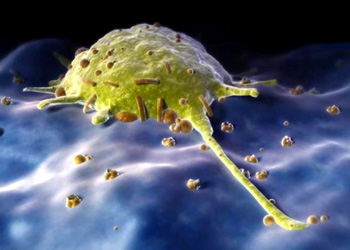 The innate immune system is the dominant system of host defense in most organisms.
The innate immune system, also known as non–specific immune system and first line of defense, comprises the cells and mechanisms that defend the host from infection by other organisms in a non–specific manner.
The innate immune system is the dominant system of host defense in most organisms.
The innate immune system, also known as non–specific immune system and first line of defense, comprises the cells and mechanisms that defend the host from infection by other organisms in a non–specific manner.
The innate immune system, also known as non–specific immune system and first line of defense, comprises the cells and mechanisms that defend the host from infection by other organisms in a non–specific manner. This means that the cells of the innate system recognize and respond to pathogens in a generic way, but unlike the adaptive immune system, it does not confer long–lasting or protective immunity to the host. Innate immune systems provide immediate defense against infection, and are found in all classes of plant and animal life. The innate immune system is thought to constitute an evolutionarily older defense strategy, and is the dominant immune system found in plants, fungi, insects and in primitive multicellular organisms.
Microorganisms that successfully enter an organism will encounter the cells and mechanisms of the innate immune system. The innate response is usually triggered when microbes are identified by pattern recognition receptors, which recognize components that are conserved among broad groups of microorganisms. Innate immune defenses are non – specific, meaning these systems respond to pathogens in a generic way. This system does not confer long – lasting immunity against a pathogen. The innate immune system is the dominant system of host defense in most organisms.